- Home
- Lauren Tarshis
I Survived the Battle of D-Day, 1944 (I Survived #18) Page 4
I Survived the Battle of D-Day, 1944 (I Survived #18) Read online
Page 4
Paul thought about this. So this old castle had always been a place where people could hide from danger.
“I haven’t been to the tower,” Mr. Leon continued. “It seems ready to crumble apart. But I’ve looked up there plenty of times. I haven’t seen any glowing eyes, or heard any whooshing wings. To tell you the truth, though, I wouldn’t mind if I did. It’s lonely in that castle when I’m sleeping there at night. It’s nice to think that there’s something watching over me. Watching over all of us.”
Paul nodded. He liked that idea, too.
They chatted quietly for another couple minutes, until the smell of salt water tickled Paul’s nose. They were getting closer to the beach.
It was time to stop talking. This was where most of the Nazis lived, and where Stroop had his headquarters. They crept along, zigzagging their way to the cliffs. There were Nazi guards patrolling the streets, but they looked relaxed. Some talked and joked.
To them this was just a regular night. Paul thought of Hitler, sleeping peacefully, with no idea of what was about to happen.
Paul led Mr. Leon over a stone wall, down a weedy path, and through another hedgerow. On the other side, the Nazis had put up barbed wire. But Mr. Leon put on thick leather gloves and took out a pair of large wire cutters. He pulled and cut the twisted, sharp-pointed wire without shredding his skin.
They hiked up a steep hill, and then there they were.
Ten deadly Nebelwerfers lined up in a row.
They didn’t look very evil. They were dull gray, with six stubby rocket tubes gathered into a bundle and mounted onto a trailer with very large tires. Each was the size of a small tractor.
Paul and Mr. Leon spotted a Nazi soldier nearby, leaning against a tree, smoking a cigarette.
Mr. Leon picked up a rock. At first Paul thought he was going to throw it at the soldier. But instead, Mr. Leon threw it in the other direction, into the woods.
The rock hit with a loud crack. He quickly picked up another one, and threw it toward the same spot. And then a third and a fourth. The four rocks hitting sounded like the footsteps of a very large person.
Which was the idea.
The guard tossed his cigarette and headed over to investigate, gripping his machine gun.
Mr. Leon and Paul waited until the guard was out of sight and scurried over.
Mr. Leon took a quick look at the Nebelwerfers.
“They’re loaded,” he said.
Even if the Nazis weren’t expecting the Allied invasion tonight, they were prepared for an attack. Paul could see the round tips of the rockets sticking out of the ends of the launching tubes.
Mr. Leon had already cut the yellow cake of C-3 into small pieces. In the low light, the pieces almost looked like madeleines.
They were each going to plant the C-3 in five Nebelwerfers. Mr. Leon gave Paul six pieces of C-3, in case he dropped one.
Heart pounding, Paul reached into a barrel on the first Nebelwerfer. He felt like he was sticking his hand down the throat of a serpent; he half expected it to get chomped off.
He moved down the row, quickly sticking a piece of the C-3 in each one. In moments he was finished. And so was Mr. Leon.
They had done it! Now, when the Nazis tried to fire them at the Allies, these deadly weapons would be blown to pieces.
Paul felt almost weak with relief.
Within the hour, they’d be safe at the castle, safe and sound. Maybe Victor would be awake.
They were creeping back across the field when the sky filled with the sound of a distant whine.
Paul knew the noise all too well: A plane was coming across the channel.
But this wasn’t one plane. Paul looked up. Hundreds of large planes were flying toward them, crowded so close together it seemed their striped wings were touching. They were larger than the bombers Paul was used to seeing.
It had to be the paratroopers!
Excitement rose up in Paul, but it quickly turned to dread. Because now the Nazis knew that the Allies were attacking them.
A siren blared.
Explosions roared from the cliffs as the Germans’ big cannons — antiaircraft guns — blasted at the planes.
And now there were Nazi soldiers everywhere, even popping up out of the ground. Paul realized he and Mr. Leon were near the entrance to an underground bunker. Soldiers rose up, like enormous ants boiling out of the dirt.
Paul looked around in horror. There was no way they could escape now.
Mr. Leon reached into his bag. He pulled out what looked like a black apple.
It was a grenade.
“We need to get these soldiers away from here,” he said. “I’m going to try to get one of those Nebelwerfers to blow. Get ready to hit the dirt and cover your ears.”
He pulled the pin from the top of the grenade and tossed it. It landed in front of one of the Nebelwerfers.
“Get down, Paul!” Mr. Leon cried.
Paul threw himself to the ground and pressed his hands to his ears as the grenade exploded.
KABOOM!
But that was just the beginning.
The air seemed to shatter as one of the Nebelwerfers blew apart.
KABOOM!
It worked! The grenade must have triggered the C-3!
Soldiers scattered, clearing the way for Mr. Leon and Paul to rush back toward the hedgerow.
But now came a new sound, an explosion from the sky.
Paul looked up in horror and saw a plane in flames. It must have been hit by one of the Nazi antiaircraft guns farther down the cliffs. Paratroopers were leaping out of the burning plane. Some of their parachutes opened.
Many did not.
The plane went into a death spiral, flames shooting from the nose and the tail. It was coming in their direction.
“Run, Paul!” Mr. Leon cried.
Paul ran wildly, snapping his head back to watch the plane as it swooped and spiraled. The gagging stench of burning metal and melting rubber seared Paul’s eyes and nose.
No matter how fast he ran, no matter in what direction, that plane was coming right at him. It was like a gigantic, burning wasp.
Paul quickly lost track of Mr. Leon. He was on his own now.
He looked up, fully expecting the plane to fall on top of him.
Something very hard smacked Paul on the head — a plane wheel or a hunk of metal, maybe. His skull felt like it had been cracked open. Blinding pain exploded behind his eyes. Paul dropped to his knees and melted into the ground.
The burning wreckage whizzed within inches of him, sailed over the edge of the cliff, and crashed onto the beach below.
A little voice whispered, Get up! Get up!
But Paul couldn’t move. He fell hard into a kind of throbbing, nightmarish sleep.
When he finally opened his eyes, hours later, it was getting light. He was dazed, and his head still hurt. He was on a rocky ledge, looking over the beach. It took him a long moment to remember what had happened, and to notice that he wasn’t by himself. There was a Nazi soldier standing over him.
Paul raised his arms in surrender.
He’d been captured.
5:50 A.M.
The soldier — he looked so young Paul wondered if he was even eighteen — held his hand out toward Paul. It took Paul a moment to understand: He was offering to help Paul to his feet.
“Danke,” Paul said.
Paul had barely realized he knew that German word.
Thank you.
Their eyes met. The soldier didn’t look like a cruel Nazi. He looked like a kid, someone Paul and Gerard might have wanted to play soccer with.
But then the young soldier suddenly stood up straight. He clicked the heels of his black boots together and threw his arm straight out in front of him — a Nazi salute. Paul whirled around and saw a furious-looking Nazi officer.
The man’s face was red with rage. He shoved the young soldier so hard the young man stumbled and almost fell. And then the officer stood over Paul, so close that Paul
could smell the man’s sour sweat.
“What are you doing here?” the Nazi bellowed. “Nobody is allowed in this area! It is strictly forbidden.” He reminded Paul of Stroop — the animal glint in his eye, the knife-sharp edge of his voice. How Paul could sense how much he enjoyed this, that he had the power to make people feel terrified.
The Nazi reached over and roughly searched Paul’s pockets. He pulled out something small.
Paul’s blood turned to ice. The C-3 — that extra slab that Mr. Leon had given him. Paul had forgotten that he still had it.
The Nazi held it up and studied it carefully. His eyes narrowed to needle slits. He knew exactly what it was, Paul could see.
Paul turned to bolt, but the Nazi clamped his hand on Paul’s arm. Paul tried to jerk away, but the hand gripped him like a metal claw.
The Nazi shouted out, and two other soldiers rushed toward them.
Paul’s heart filled with terror as he thought of what would happen next. They would drag him to some dark dungeon, and make him tell them where he had gotten the C-3. Paul’s mind flashed with knives, with flames, all the terrible ways the Nazis would hurt him so he’d tell them his secrets — about the resistance, Mr. Leon, and Maman.
Thunder rumbled, as though Paul’s fear was tearing open the sky.
Paul glanced out over the English Channel. Through the thick fog, he could see small flashes of orange.
There was a faint whistling sound that got louder and louder and louder:
Sssssssssssssssss.
Seconds later,
Kaboom!
An explosion rocked the ground. Both Paul and the Nazi fell into the grass. Paul rolled away from him as black, billowing smoke blinded him. Everything around Paul seemed to go quiet.
He coughed, and tears poured from his eyes. The smoke cleared, and Paul saw that the Nazi who’d grabbed him was still on the ground, deathly still. That blast had killed him.
Paul scrambled to his feet. He still had no idea what was happening, but this was his chance to get away from here. He started to run.
But then it hit him … that thundering sound. The bright orange flashes through the fog. The explosion.
The Allied ships were here!
The thunder roared again.
Sssssssssssssssss. Kaboom!
The Allies were firing from their battleships, Paul realized. They must be trying to crush the Nazi defenses — the machine guns and cannons that were lined up on the cliffs. The Allies wanted to clear the way before their soldiers poured onto the beaches.
But if Paul didn’t get out of here now, those Allied battleships were going to crush him, too.
6:30 A.M.
Paul had to find somewhere to hide. But where?
Off to the side he saw a big hedgerow, behind a pile of rocks. The rocks might just protect him from the blasts. The hedgerow could keep him hidden from the Nazis.
Paul rushed over. The tall, prickly bush looked as solid as a wall. But of course Paul knew better. He quickly found an opening, a place where the branches grew apart.
His heart was racing. But he closed his eyes and imagined that Gerard was sitting next to him.
It had suddenly grown very quiet. The Allied guns had stopped firing.
Paul opened his eyes, and stared ahead at the sea with wonder.
The fog had disappeared. And so, it seemed, had the English Channel.
All Paul could see now were ships — thousands and thousands of them. There were ships and boats of all sizes and shapes. Above them, in the sky, floated hundreds of huge silver balloons. Paul wasn’t sure, but he thought maybe those were meant to keep enemy planes from swooping down to attack the ships.
The boats stretched out as far as Paul could see, in every direction.
Mr. Leon’s voice rang through Paul’s mind.
The largest invasion by sea in the history of the world.
And unlike the legend of the dragon, these words were true. Paul saw it all with his own eyes. If only Gerard were here to see it with him.
The ships sped forward.
Why weren’t the Nazis attacking back? Where were the cannons and machine guns that lined the cliffs?
Paul’s heart rose.
Had those Allied battleships destroyed all the cannons and machine guns? Were the Nazis slinking away or huddled in their bunkers?
The first of the ships were just a few hundred yards from the shore now. Paul pulled the branches open a little more so he could see better. He fixed his gaze on one of the smaller boats. It was still very far away. But Paul could see that it was packed with soldiers, rows of men in green. The boat rose up and down as it plowed forward through the rough waves. Paul imagined how water must be spraying into the boat, soaking the men. They must be freezing.
And scared.
The boat stopped when it was still maybe two hundred yards away from shore. That was the closest the boats could come, Paul realized. The Germans had lined the beach with giant metal and wooden stakes. There were also underground bombs — mines — buried under the sand, Paul had heard.
Paul leaned forward so his face was out of the hedge. He watched as the front of that boat was lowered, and men slid into the water that rose to their chests.
They were quickly joined by other men, from other boats. They pushed their way forward, through the choppy sea.
“Come on! Come on!” Paul wanted to shout.
And that’s when the German guns came to life.
Cannons blasted from the cliffs.
Kaboom!
Machine guns roared.
Brrrrrrrrrrttttt! Brrrrrrrrrrrrtttt!
Paul froze in horror as men were mowed down by the dozens. By the hundreds.
There was so much smoke that the ships seemed to disappear. But he heard the explosions as the ships were hit. He saw the flames.
And the men.
More and more of them were in the water now, making their way toward the beach. They pushed through the spray of machine gun fire. Some fell back and sank into the bloody water. But others made it to the beach.
And then?
There was no place for them to hide from the nonstop spray of machine gun fire.
Soon the beach was covered with bodies. Men cried out for help. Red, foaming waves crashed onto the shore.
Something inside Paul’s mind seemed to snap.
His eyes stopped seeing. His ears stopped hearing.
He leaned back and the branches seemed to wrap themselves around his body.
The leaves seemed to put gentle fingers over his face.
The hedgerow seemed to grow and grow, surrounding Paul like the walls of a castle.
Paul sat there, praying for this nightmare to end.
—
“Son? Son?”
Paul’s eyes snapped open.
He was looking into the face of a man with very dark skin. A soldier, wearing a helmet. He gently grabbed hold of Paul, like he was a wounded baby deer. And he pulled him out of the hedgerow.
Paul saw the American flag patch on the arm of his uniform.
The soldier helped Paul to his feet and waited a minute.
“Okay?” he said, raising his eyebrows.
Paul nodded, though he wasn’t sure what the man meant.
The soldier gave him a pat on the arm and hurried off.
Paul had no idea how much time had passed. He felt dazed. But the battle was still raging. Machine guns still roared. The cannons exploded. But somehow those Americans had made it up here.
So all was not lost.
Paul refused to look at the channel or the beaches.
He just wanted to get back to Maman.
The thick smoke made it hard to see, but Paul could run this route with his eyes closed.
Nobody tried to stop him.
THREE DAYS LATER
JUNE 9, 1944
CASTLE LE ROC
3:00 P.M.
Paul and Maman were alone in the radio room, listening to the news on the radio.
/>
“This is the BBC, London, reporting from the Allied invasion of France. Our landings have been successful and more troops and supplies are on the way. Fighting continues, but Allied forces continue to take control …”
In the distance they could hear the sounds of Allied planes, and bombs falling farther to the south. But for now they felt safe in the castle. Victor was asleep. He was feeling stronger, but it was still a struggle for him to stand for more than a few minutes at a time. Of course Ellie was watching over him, sitting at the edge of the mattress.
Pierre and Mrs. Bernard had gone home. So now it was just Maman and Paul, alone. Like it used to be. Except not exactly. Now they had no secrets between them.
They listened to the radio a while longer. But then Maman turned the radio off.
“I think we need a little quiet,” she said.
Paul agreed. The silence helped soothe his head, which still ached from when he got hit on the night of the invasion.
He got up and looked out the window.
He wasn’t looking for paratroopers anymore. Now he was looking for Mr. Leon. His teacher had never returned from the cliffs that night. Nobody knew what had happened.
Maman came up behind him. They both stood there a moment, looking out into the gray afternoon.
“Help me get some water,” she said, waving for Paul to follow her outside. They kept buckets placed outside the walls to catch rainwater to drink and wash with.
The afternoon was chilly, raining on and off. But it felt good to be out in the fresh air. He and Maman each picked up a wooden bucket.
Suddenly they heard running footsteps.
Paul turned and saw three Nazi soldiers heading toward them. In front was Stroop.
Paul and Maman froze, but then Maman put down her bucket. She stood up very straight, and managed to hide the fear that must have been gripping her by the throat.
“Search the castle,” Stroop ordered the men, who strode through the castle door.
He walked over and stood very close to Maman. His eyes flicked across her face.
“Where is he?” he asked in an icy voice.

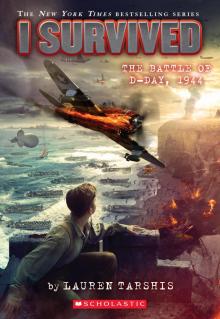 I Survived the Battle of D-Day, 1944 (I Survived #18)
I Survived the Battle of D-Day, 1944 (I Survived #18)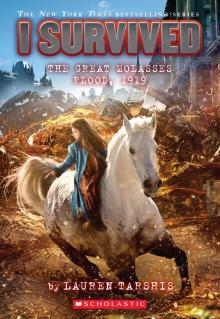 I Survived the Great Molasses Flood, 1919
I Survived the Great Molasses Flood, 1919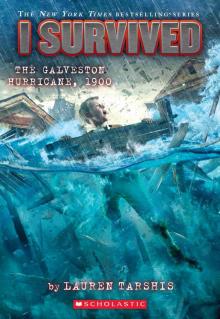 I Survived the Galveston Hurricane, 1900
I Survived the Galveston Hurricane, 1900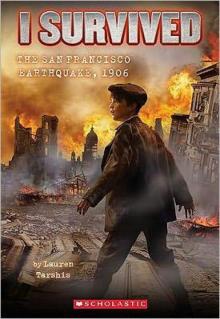 I Survived the San Francisco Earthquake, 1906
I Survived the San Francisco Earthquake, 1906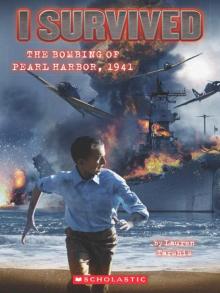 I Survived #4: I Survived the Bombing of Pearl Harbor, 1941
I Survived #4: I Survived the Bombing of Pearl Harbor, 1941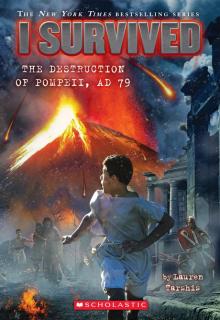 I Survived the Destruction of Pompeii, AD 79
I Survived the Destruction of Pompeii, AD 79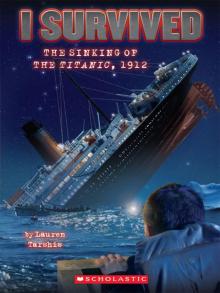 I Survived #1: I Survived the Sinking of the Titanic, 1912
I Survived #1: I Survived the Sinking of the Titanic, 1912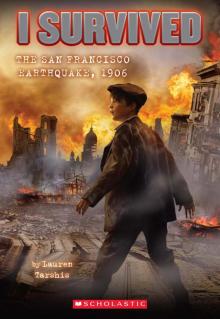 I Survived #5: I Survived the San Francisco Earthquake, 1906
I Survived #5: I Survived the San Francisco Earthquake, 1906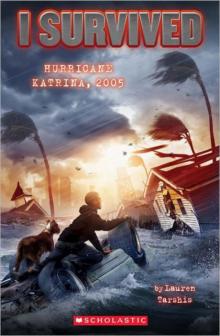 I Survived Hurricane Katrina, 2005
I Survived Hurricane Katrina, 2005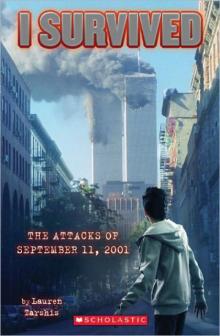 I Survived the Attacks of September 11th, 2001
I Survived the Attacks of September 11th, 2001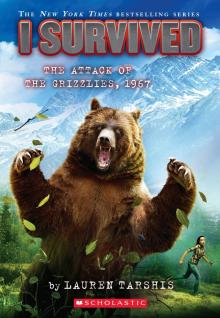 I Survived the Attack of the Grizzlies, 1967
I Survived the Attack of the Grizzlies, 1967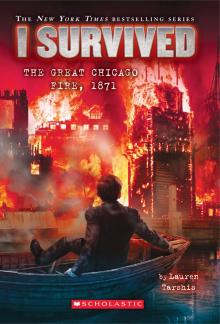 I Survived the Great Chicago Fire, 1871
I Survived the Great Chicago Fire, 1871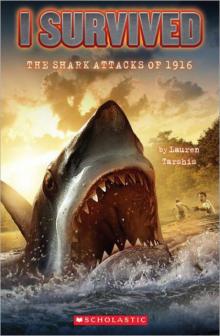 I Survived the Shark Attacks of 1916
I Survived the Shark Attacks of 1916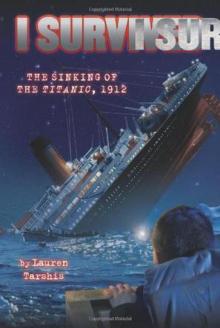 I Survived the Sinking of the Titanic, 1912
I Survived the Sinking of the Titanic, 1912 Emma-Jean Lazarus Fell Out of a Tree
Emma-Jean Lazarus Fell Out of a Tree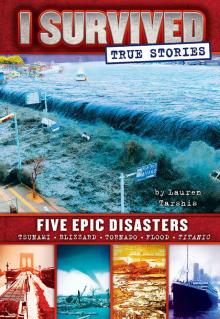 I Survived True Stories: Five Epic Disasters
I Survived True Stories: Five Epic Disasters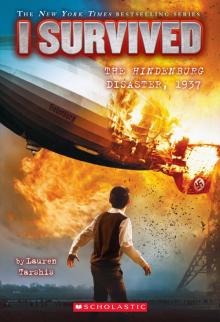 I Survived the Hindenburg Disaster, 1937
I Survived the Hindenburg Disaster, 1937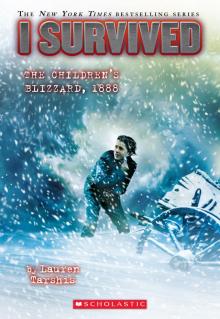 I Survived the Children's Blizzard, 1888
I Survived the Children's Blizzard, 1888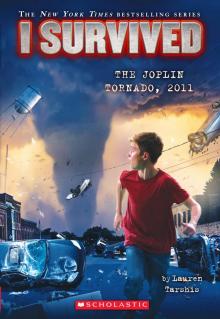 I Survived the Joplin Tornado, 2011
I Survived the Joplin Tornado, 2011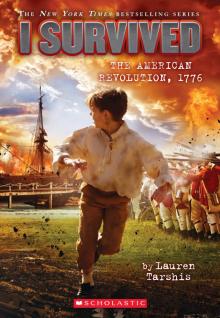 I Survived the American Revolution, 1776
I Survived the American Revolution, 1776 Emma Jean Lazarus Fell in Love
Emma Jean Lazarus Fell in Love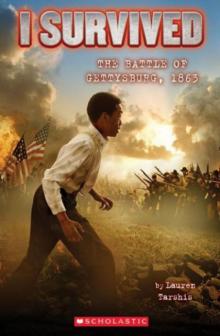 I Survived the Battle of Gettysburg, 1863
I Survived the Battle of Gettysburg, 1863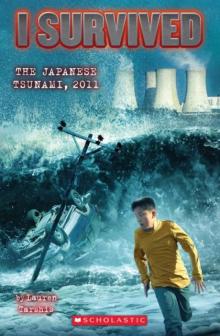 I Survived the Japanese Tsunami, 2011
I Survived the Japanese Tsunami, 2011